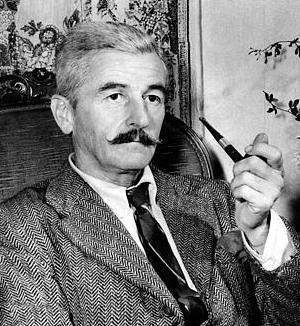"In writing, you must kill all your darlings."
-- William Faulkner
In writing and in life, it behooves us to remain as free from attachment as possible. Now, you may immediately wonder, "What does that mean? Especially when it comes to writing?!"
Here are a few thoughts to consider. It's not uncommon for writers to occasionally get attached to certain words, phrases or passages, which inevitably feel essential to getting our message or story across. The problem with such "attachment" is we find ourselves disappointed when we're told (by editors or agents or publishers or readers), "That part didn't really work for me."
Smart writers who receive such feedback, however, will not get disgruntled or defensive at such comments, but will instead adopt a more humble attitude and look to see if they're holding too tightly to a particular way of expressing themselves or are too close to their phrasing to evaluate it objectively. When a reality check arrives from respectable reviewers, calling out to "let it go," the wiser authors among us will maintain an open mind to revising the portion in question, editing it, or writing a new draft.
I'm not quite sure what causes a writer's attachment to his or her own words (including my own), but the fact is -- and I've told this to more than one client--the vast majority of books in Barnes & Noble or any independent bookstore have been professionally edited. To me, that means (at least in some measure) all of these authors have "just said no" to their literary attachments by putting their manuscript in the hands of someone whose job it is to remain objective, whose proficiency is in the area of taking a writer's manuscript and editing it, revising it, streamlining it and polishing it until it's as compelling and reader-friendly as possible, devoid of anything that doesn't contribute to the very best reading experience.
And yes, writers all over the world pay professional book editors to do this for them. Talk about how prevalent attachment is in the field of writing!
My point is, as a writer, if you devote some extra time to doing some self-editing, including letting go of any attachments to "pet" words, phrases and passages, you'll very likely end up with a better manuscript to submit, either to a professional editor (you'll be making his/her job easier, which often means it will cost you less money to arrive at a top-quality final edited draft) or to a literary agent or book publisher.
I've provided an example below for you to see what attachment can do to a piece of writing and what letting go of attachment can do for it. The first version is unedited and the second version is edited. Hopefully, after reviewing both versions, you'll be able to tell quite easily the difference between them.
Example A.:
"What happens with the governments that aren't participating in the consensus?"
"That's the incredible part about the U.N. -- everyone's here. For the first time in history, every important nation in the world was invited to a single meeting to solve a global problem, and they all came. Look at the Olympic Games -- some big-shot nation always boycotts the Games as a political statement, although the Games are pretty innocuous, as far as politics goes. The U.S. boycotted the 1980 Moscow Games, and Russia boycotted the 1984 games in Los Angeles. But everybody came to this U.N. conference."
"Interesting point. So, how does this consensus get going?"
Example B.:
"What happens with the governments that aren't participating in the consensus?"
"That's the incredible part about the U.N.--everyone's here. For the first time in history, every important nation in the world was invited to a single meeting to solve a global problem, and they all came."
"Interesting point. So, how does this consensus get going?"
It's clear the writer of the first version was attached to using the Olympics as an example of an event where not everyone attends. But in the second version, the editor has deleted that portion, recognizing it wasn't really necessary to get the main point across and actually created an interruption to the narrative flow.
While letting go of our attachment to favorite expressions can be daunting, the art of writing invites us to be courageous and "Kill our darlings" (as Mr. Faulkner suggests in the opening quote) for the sake of a better overall piece of writing.
"The root of suffering is attachment." -- The Buddha
Similarly, when we hold on too tightly to something in our personal lives--anything or anyone--inevitably our attachment causes us to suffer. When my friend doesn't do what I'm emotionally attached to him doing (for example, he doesn't show interest in helping me work on my car, which I've been bugging him to do for weeks), I end up feeling anxious inside and helpless that I can't control him to do it now. But when I let go of my expectation or "need" for his compliance at that moment, I free myself to simply be present with whatever is going on in my life (including my looking for options to him fixing it)... without the accompanying internal stress or struggle.
Another way of seeing the matter of attachment involves the recognition of our inability to actually control what's going on outside of us -- and in our acceptance of this, we're more able to release attachment to or dependence on specific results we've previously believed we needed in order to be happy. And in so doing, we unbind ourselves to appreciate (and even enjoy) all the more what does happens to be present right there before us.
Keeping alert to any feelings of resistance or resentment (either subtle or intense) -- whether in our writing or our personal lives -- will likely go a long way in pointing out to us where it might be good to consider following the wise advice of the recent Oscar-winning theme song from the Disney movie, Frozen... Let it Go!
Learn more about Will Mathes here
Check back at the start of May for Will's next monthly blog-post focused on more "Writing Tips & Thoughts That Can Make a Difference"...

